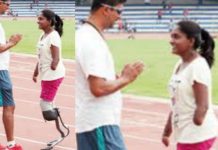India, Mozambique sign significant pact on pulses
In his his five-day tour of four African countries Mr. Modi arrived in Mozambique.
A significant “long-term” agreement was signed between India and Mozambique, under which India will buy pulses from this country to plug its shortfall and contain prices of this commodity. This followed Prime Minister Narendra Modi’s wide-ranging talks with Mozambican President Filipe Nyusi in Maputo.
The agreement to buy pulses would meet India’s requirements and help raise the farmers’ income in Mozambique.
India will also help build capacities of Mozambique’s security forces.
Mr. Modi said terrorism is the “gravest threat” to the world and there was need to bolster security and defence ties between India and Mozambique, which are connected by the Indian Ocean. The networks of terrorism were interlinked with other crimes, including drug trafficking. To curb this menace, India and Mozambique signed a pact.
Mr. Modi talked about the “emerging security challenges”, including in the maritime areas the two countries would step up security and defence cooperation.
Mr. Modi noted that agriculture development is the top priority for Mozambique. India would be partnering this endeavour through development of agricultural infrastructure and productivity in this country.
Describing Mozambique as the “gateway” to Africa, Mr. Modi said one-fourth of India’s investment in this continent is in this country. The bilateral trade had continued to grow and there was need to provide a “nurturing” environment.
PM pays tributes to Babu Jagjivan Ram on his death anniversary
The Prime Minister, Shri Narendra Modi, paid tributes to Babu Jagjivan Ram on his death anniversary on 6th July.
Key facts:
- Jagjivan Ram, popularly known as Babuji was a national leader, a freedom fighter, a crusader of social justice, a champion of depressed classes, an outstanding Parliamentarian, a true democrat, a distinguished Union Minister, an able administrator and an exceptionally gifted orator.
- Jagjivan Ram had organized a number of Ravidas Sammelans and had celebrated Guru Ravidas Jayanti in different areas of Calcutta(Kolkata).
- In 1934, he founded the Akhil Bhartiya Ravidas Mahasabhain Calcutta and the All India Depressed Classes League. Through these Organizations he involved the depressed classes in the freedom struggle.
- In October 1935, Babuji appeared before the Hammond Commission at Ranchi and demanded, for the first time, voting rights for the Dalits.
- Babu Jagjivan Ram played a very active and crucial role in the freedom struggle. Inspired by Gandhiji, Babuji courted arrest on 10 December 1940. After his release, he entrenched himself deeply into the Civil Disobedience Movement and Satyagraha.
- Babuji was arrested again on 19 August 1942 for his active participation in the Quit India Movement launched by the Indian National Congress.
- He has also served as the deputy prime minister of India.
Network Readiness Index
India has slipped two places to the 91st position on a global list of countries in terms of their readiness for transition to a digitised economy and society.
The annual Networked Readiness Index was released by the Geneva-based World Economic Forum (WEF). The index, forming part of the WEF’s Global Information Technology Report, measures countries’ success in creating the conditions necessary for a transition to a digitised economy and society.
Key facts:
- Among the major emerging markets, India is ranked the lowest with Russia retaining the top place at 41st rank, followed by China at 59th (up three places), South Africa up 10 places at the 65th spot and Brazil moving up to the 72nd position.
- The list is once again topped by Singapore while Finland has also retained its second place.
- Others in the top-ten are Sweden, Norway, the US, the Netherlands, Switzerland, the UK, Luxembourg and Japan.
- India’s position on the list has come down for the fourth year in a row, from 89th in 2015, 83rd in 2014 and 68th in 2013.
- While India has scored better in terms of political and regulatory environment (78th position), it fares worse in terms of business and innovation environment (110th).
- In terms of infrastructure it is even worse at 114th place, while it is ranked very high at 8th place in terms of affordability. India also fares poorly on sub-indices for skills and individual usage.
- According to the report, lack of infrastructure (114th) and low levels of skills among the population (101st) remain the key bottlenecks to widespread ICT adoption, especially in terms of individual usage (120th).
- The report further noted that a third of the Indian population is still illiterate and a similar share of youth is not enrolled in secondary education.
- India’s performance in terms of providing online services and allowing e-participation has so far been in line with that of peer countries, but far from the global best (57th and 40th, respectively).
‘Almost 30 per cent of our land undergoing degradation’
According to a study, nearly 30% of the country’s total geographical area is undergoing degradation. The ongoing study, initiated by the Ministry of Environment, Forests & Climate Change, was led by the Indian Space Research Organisation and involved 19 institutes. The study analysed satellite imageries of the country over an eight-year period.
- The report was recently released by ISRO’s Space Applications Centre in the form of a ‘Desertification and Land Degradation Atlas’, combining GIS and remote sensing data.
Highlights of the report:
- The degrading area has increased over 0.5% to 29.3 million hectares during the period 2003-05 and 2011-13. Desertification increased by 1.16 million hectares (m ha) and stood at 82.64 m ha during 2011-13.
- There was high desertification and degradation in Delhi, Tripura, Nagaland, Himachal Pradesh and Mizoram, while Odisha, Telangana, Rajasthan and Uttar Pradesh showed some improvement.
- Just nine States together account for nearly 24% of desertification; the other States have less than one per cent of this land. The culprit States in that order are Rajasthan, Maharashtra, Gujarat, Jammu & Kashmir, Karnataka, Jharkhand, Odisha, Madhya Pradesh and Telangana.
- Southern State Kerala figures among northern and northeastern States where less than 10% land is degraded. With it are relatively greener States of Assam, Mizoram, Haryana, Bihar, Uttar Pradesh, Punjab and Arunachal Pradesh.
- The main culprit for degradation is water erosion (26%) followed by degrading vegetation (rising slightly nearly 9%) and land or soil erosion due to wind.
India has committed itself to the U.N. Convention on Combating Desertification that it would fully stop land degradation by 2030. The atlas, adding 68 vulnerable districts, would form part of the country’s action plan to arrest the phenomenon and also be a status report to the U.N. body.

















